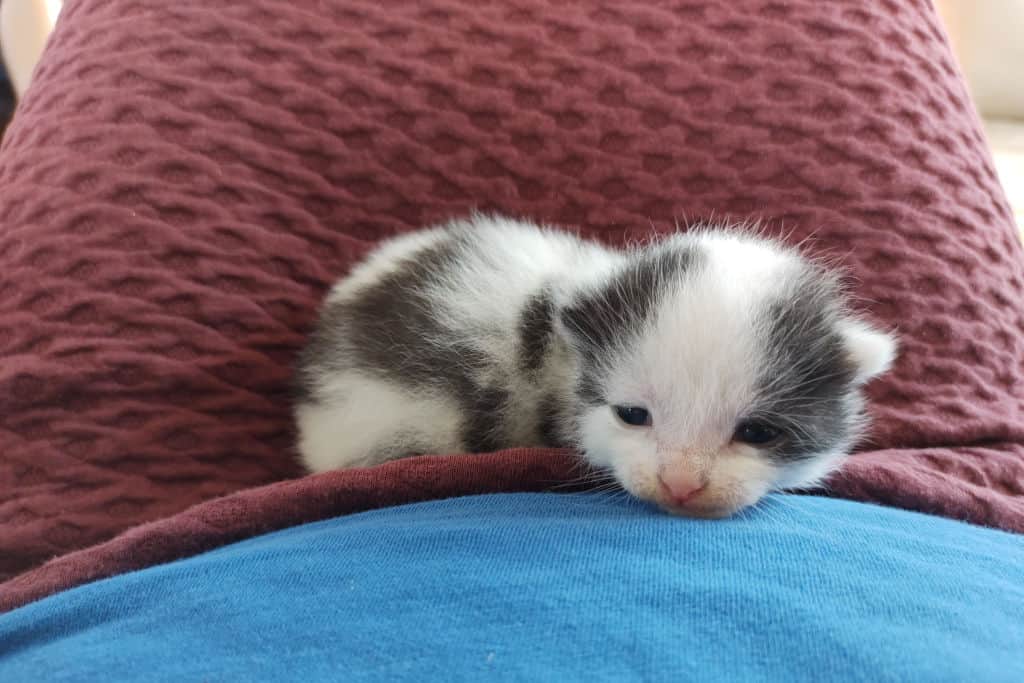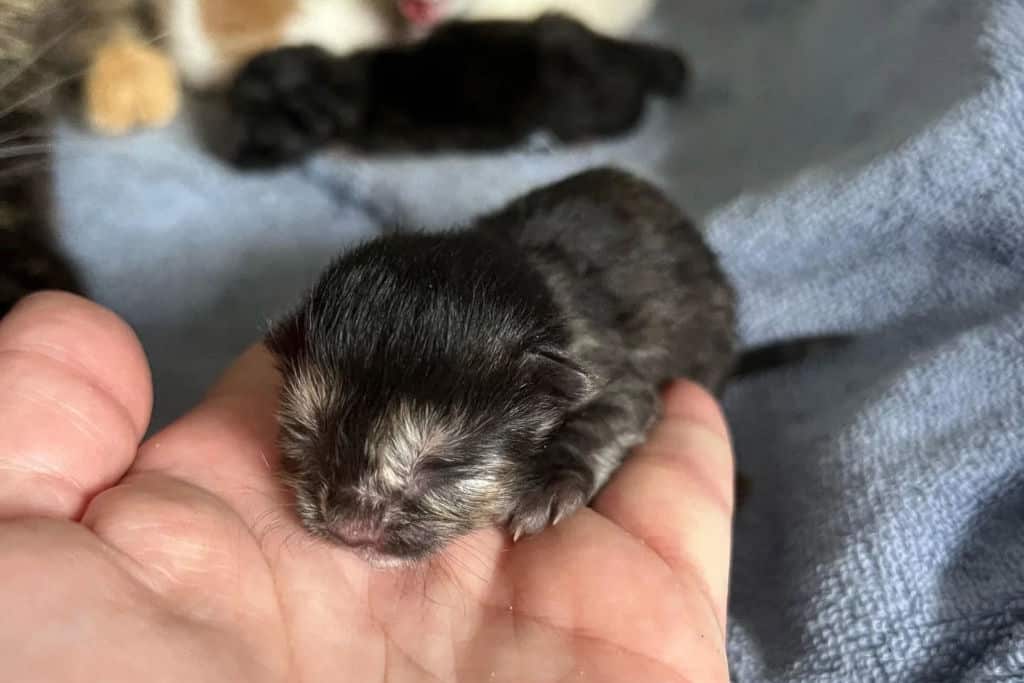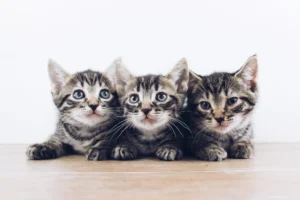Panting in newborn kittens is not normal, and it’s essential to learn what to do and how to recognize and deal with abnormal kitten breathing.
For those who’ve recently adopted, it’s crucial to remember that kittens, like human infants, may exhibit signs of stress differently than older cats. Panting, in this context, signals an urgent need for attention.
This article explores what normal breathing in newborn kittens is, what panting means, and what to do if your newborn kitten is panting.

How to Tell if Your Newborn Kitten Is Breathing Normally?
To tell if a newborn kitten is breathing normally, look for the following:
- Respiratory rate. A healthy kitten should have a respiratory rate of 10-18 BPM at birth and 16-32 BPM after 1 week. If the kitten’s breathing rate is higher than this, it could indicate a problem.
- Heart rate. Heart rate of 220-260 beats per minute
- Chest movement. The kitten’s chest should rise and fall evenly with each breath.
- No noise. The kitten’s breathing should be quiet and free of wheezing, clicking, or other unusual sounds.
The kitten is breathing abnormally if it’s:
- Showing labored breathing
- Having a respiratory rate of above 18BPM at birth and 32 BPM after 1 week
- Slow or irregular heart rate
- Showing irregular chest movement
- Noises during breathing, such as crackling or wheezing
- Showing rapid nasal flaring (widening of the nostrils), which can sometimes precede panting and suggests the kitten is struggling for air.
If you suspect your kitten is not breathing normally, seek veterinary care immediately.
What Does It Mean if a Newborn Kitten Is Panting?
Panting in newborn kittens is not normal and can indicate a severe problem. In contrast to older cats who might pant after intense play or during particularly hot days, newborn panting is a red flag. Always consider it a potential emergency.
It could be a sign of pain, infection, overheating, respiratory distress, or other underlying health issues.
Some specific causes of panting in newborn kittens include overheating, pain/discomfort, respiratory distress, heart problems, and shock.
Overheating is a typical cause of panting. Newborn kittens cannot regulate their body temperature effectively and may overheat if exposed to high temperatures.
Panting can also be a sign of pain or discomfort, for example, from trauma or infection. Signs of trauma in a newborn kitten may be subtle, like a slightly misaligned limb or less mobility on one side, but can lead to panting due to internal distress.
In addition, panting can signify respiratory distress, such as pneumonia, other respiratory infections, or congenital disabilities affecting the respiratory system.
Panting can also indicate heart problems, such as heart failure or murmurs, and it can also be a sign of shock, which can occur as a result of injury, illness, or other traumatic events.
Often, if the kitten is panting, it may be dehydrated, or the mom is not taking good care of them. They may be overheated, but a veterinarian must examine them to verify whether they are genuinely panting.

What to Do if Your Newborn Kitten Is Panting?
Kittens are the most vulnerable in the first few weeks after birth, so you must continually watch them.
If your newborn kitten is panting, it’s essential to take the following steps:
- Keep the kitten calm and still. Avoid handling the kitten too much, as this can increase their panting.
- Provide a cool and comfortable environment. Ensure the kitten is in a cool and well-ventilated area to help lower their body temperature.
- Contact a veterinarian. Panting in newborn kittens can be a sign of a serious health issue, and prompt veterinary attention is necessary to diagnose and treat the underlying cause.
- Provide fluid. Offer the kitten small amounts of water or a rehydrating solution to help prevent dehydration, especially if they have been panting for an extended period of time.
- Monitor the kitten’s breathing and behavior. Watch the kitten closely for any changes in breathing or behavior, and seek veterinary attention immediately if their breathing becomes labored or they show any other signs of distress.
As far as overheating go, if you have a heat light, ensure it is not too close to the kitten. If the mother cat is nursing, she usually takes care of any issues. They also play with their kittens and discipline them.
However, even the mother can get stressed and unable to care for the kittens properly, such as when they become mothers too soon. So watch for any abnormalities in the mother’s behavior.
Panting in newborn kittens can signify serious problems, and prompt veterinary attention is necessary to diagnose and treat the underlying cause.
Newborn Kitten Panting with a Hissing Noise
Newborn kittens panting with a sound resembling a “hiss” can be puzzling. This isn’t a genuine hiss, but a softer exhalation. It’s their way of clearing tiny airways or signaling discomfort. Their respiratory systems, still adapting, can sometimes produce unexpected noises.
If this “hissing” sound persists during panting, it might hint at respiratory distress or minor blockage. Maybe they’re navigating through mucus or a slight obstruction.
A quick tip: Clear the kitten’s nose with a moist, gentle cloth. If the noise continues or the kitten seems uneasy, it’s vet time. Always prioritize your kitten’s comfort and health.
What Is the Difference Between Suckling and Panting?
Kittens will suckle on a blanket, your finger, or other similar objects. When they suckle, you can see their tongue, which is typical. Many adult cats will do this on occasion, but cats who were weaned too young are more inclined to do so. The behavior is cute and harmless as long as they’re not sucking so hard that it causes harm. It is also a sign that they’re hungry.
However, panting is quite different from suckling. When kittens pant, their eyes, tails, and postures, show that they are usually not as comfortable as they normally are. Their mouths are typically more open, their breathing is generally audible, and they usually have more open mouths.
In conclusion, suckling is a normal and necessary habit for newborn kittens to acquire milk from their mother, whereas panting is a quick and shallow breathing pattern that can suggest a health problem.
FAQs
Is it possible for a newborn cat to overheat?
Yes, newborn kittens can overheat. They can’t regulate body temp well and are prone to overheating due to exposure to high temperatures or stress. Overheating can lead to dehydration and, in severe cases, heat stroke and death.
What happens if you have too much contact with newborn kittens?
Too much contact with newborn kittens can disrupt their normal routine and cause stress, leading to panting, decreased appetite, and lethargy. This can impact their health and well-being and potentially slow their growth and development.
How do you make a newborn kitten relax?
To help a newborn kitten relax:
- Provide a warm, quiet, and comfortable environment.
- Handle gently, offer a soft resting place, and keep noise levels low.
- Offer regular feeding and cuddling for comfort.
- Minimize over-handling to avoid stress and promote relaxation.
Alex, a passionate animal lover, has experience in training and understanding animal behavior. As a proud pet parent to two dogs and three cats, he founded AnimalReport.net to share insights from animal experts and expand his knowledge of the animal kingdom.




